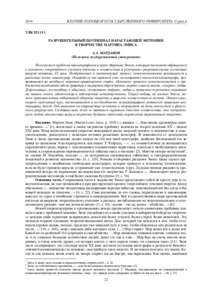Please use this identifier to cite or link to this item:
https://elib.psu.by/handle/123456789/11415Full metadata record
| DC Field | Value | Language |
|---|---|---|
| dc.contributor.author | Марданов, А. А. | - |
| dc.date.accessioned | 2015-04-02T10:18:33Z | - |
| dc.date.available | 2015-04-02T10:18:33Z | - |
| dc.date.issued | 2014 | - |
| dc.identifier.citation | Вестник Полоцкого государственного университета. Серия A, Гуманитарные науки : научно-теоретический журнал. - 2014. - № 10. – C. 22-26. | ru_RU |
| dc.identifier.issn | 2070-1608 | - |
| dc.identifier.uri | https://elib.psu.by/handle/123456789/11415 | - |
| dc.description | The Destructive Potential of Increasing Entropy in Martin Amis’s Works. A. Mardanau | ru_RU |
| dc.description.abstract | Исследуется проблема катастрофизма в прозе Мартина Эмиса, который постоянно обращается к тематике энтропийного угасания планеты и человечества в результате разрушительных тенденций второй половины ХХ века. Необратимый и закономерный процесс самоуничтожения воплощается в различных типах катастроф. Основной из них является уже состоявшаяся этическая катастрофа, проявляющаяся во всеобщем морально-нравственном упадке. Осознание процесса самоуничтожения и приближения неизбежной гибели приводит к ощущению обречённости, утрате смысла жизни, «смерти» любви. Дефективные, неспособные к общению, сочувствию, доброте, любви и прощению персонажи страдают от паники, тоски, одиночества и собственной неполноценности. Только любовь, по мнению Эмиса, может противостоять набирающей обороты энтропии и вывести человечество из тупика. Однако существует замкнутый круг, заключающийся в неспособности деградировавших родителей правильно воспитывать детей. Они внушают им извращённые ценности и направляют на путь этического и физического разрушения. Следовательно, дети не являются гарантом спасения человечества, что символизирует полное отсутствие веры в сохранение будущих поколений, торжество нарастающей энтропии.= This article deals with the problem of the entropic decay of the planet and mankind as a result of the destructive tendencies of the second half of the 20th century as depicted in the works of M. Amis. The irreversible and naturally determined process of their self-destruction is embodied in various types of catastrophes including the already established ethical catastrophe which is made manifest in the overall decline of morality. The awareness of self-elimination and of imminent death, results in a feeling of doom, a loss in the meaning of life, and the “death” of love. Defective characters who are incapable of communication, sympathy, kindness, love and forgiveness, suffer from fits of panic, depression, solitude and lack of self-worth. In Amis’s opinion, it is only love that can resist the expansion of entropy and help mankind find a way out of the impasse. However, there is a vicious cycle that presupposes the inability of degraded parents to rear their children properly. They instill their perverted values into them and guide them towards ethical depravity and physiological decay. Thus children cannot be guarantors for the salvation of mankind, which means a total lack of belief in the preservation and survival of future generations and enforces the triumph of increasing entropy. | ru_RU |
| dc.language.iso | ru | ru_RU |
| dc.publisher | Полоцкий государственный университет | ru_RU |
| dc.relation.ispartof | Вестник Полоцкого государственного университета. Серия A, Гуманитарные науки | ru_RU |
| dc.relation.ispartof | Веснік Полацкага дзяржаўнага ўніверсітэта. Серыя А, Гуманітарныя навук | be_BE |
| dc.relation.ispartof | Herald of Polotsk State University Series A, Humanity sciences | en_EN |
| dc.relation.ispartofseries | Серия A, Гуманитарные науки;2014. - № 10 | - |
| dc.rights | open access | ru_RU |
| dc.subject | Государственный рубрикатор НТИ - ВИНИТИ::ОБЩЕСТВЕННЫЕ НАУКИ::Литература. Литературоведение. Устное народное творчество | ru_RU |
| dc.subject | проза Мартина Эмиса | ru_RU |
| dc.title | Разрушительный потенциал нарастающей энтропии в творчестве Мартина Эмиса | ru_RU |
| dc.type | Article | ru_RU |
| Appears in Collections: | 2014, № 10 | |
Items in DSpace are protected by copyright, with all rights reserved, unless otherwise indicated.
